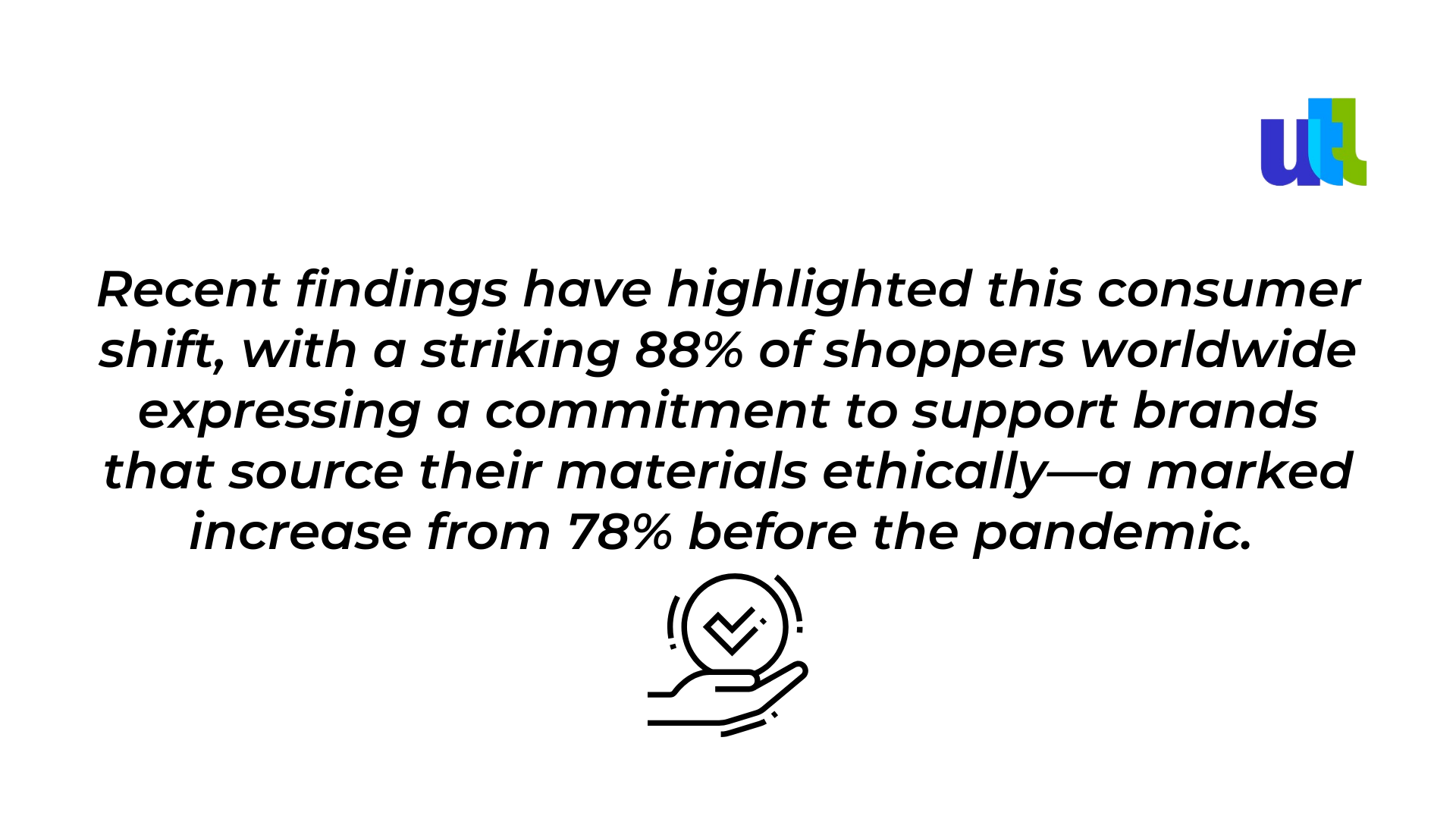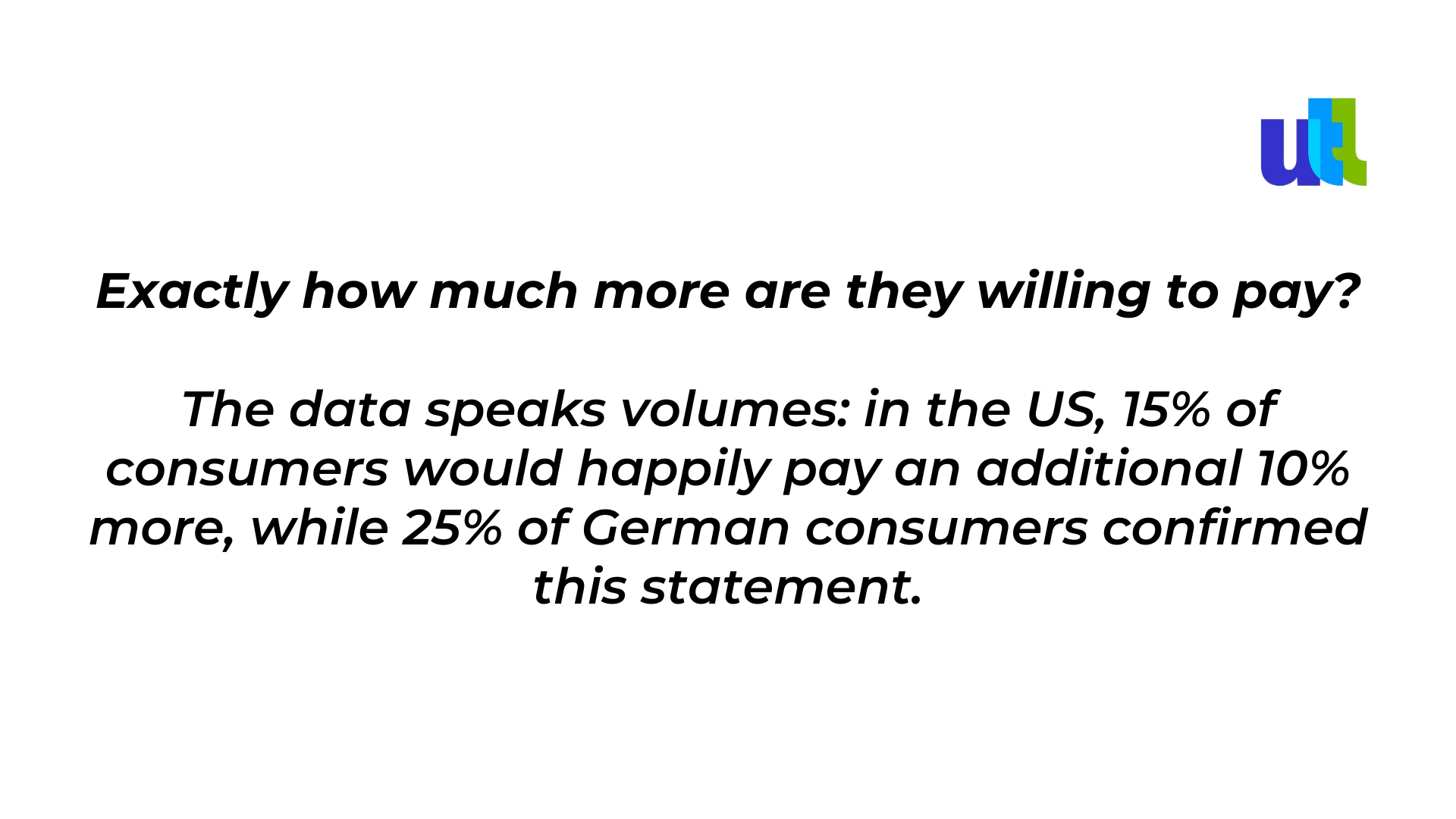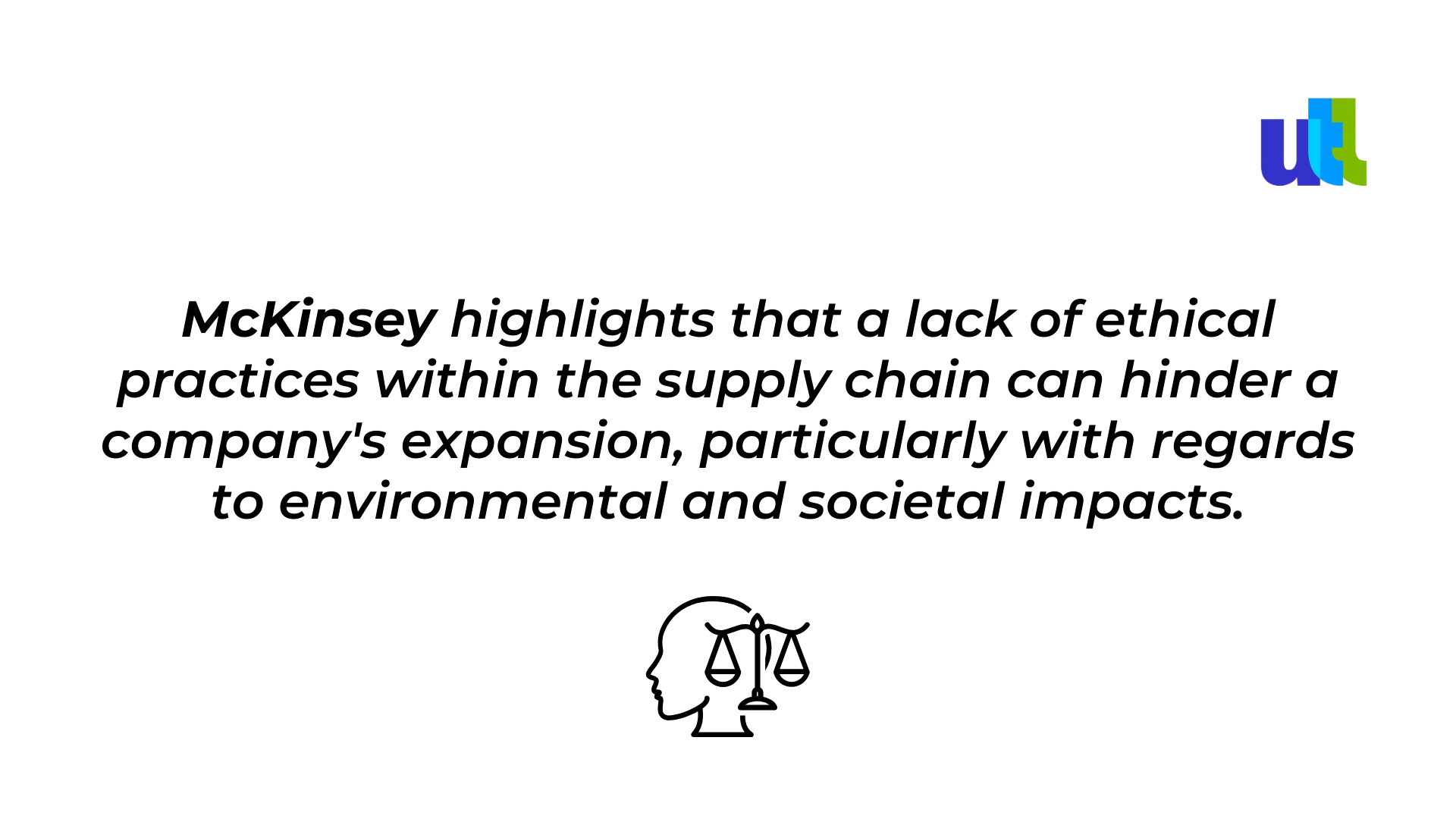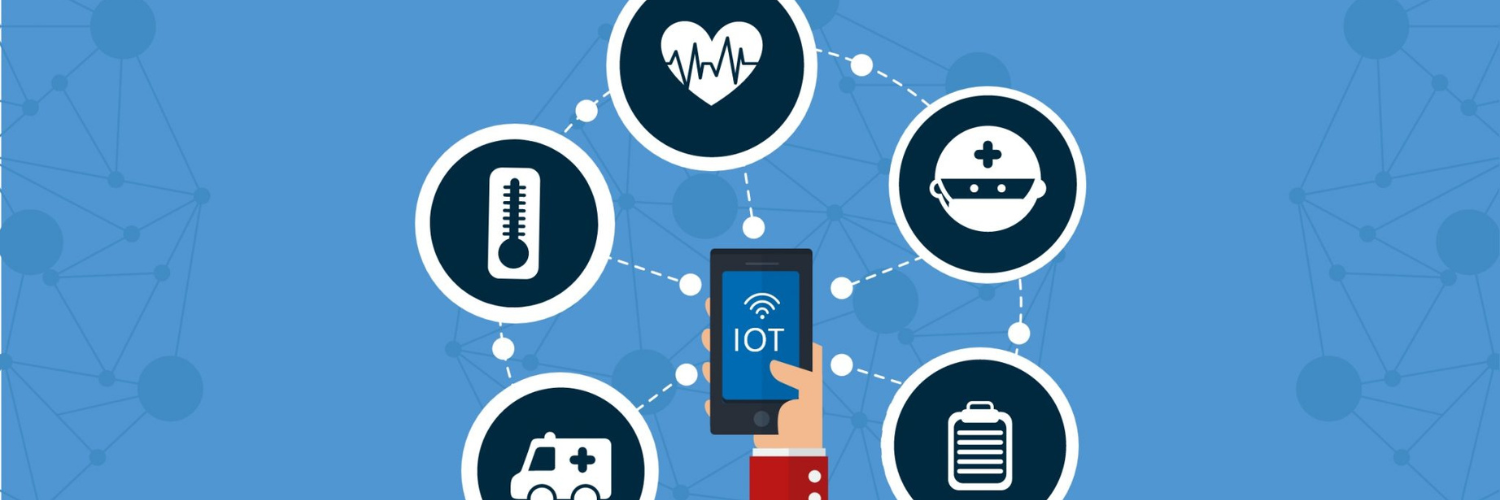In the past few years, shoppers have increasingly cared about buying products that are good for the planet and society. This interest grew stronger when the pandemic started, and more people shopped online. They began to pay more attention to how their shopping affects things like pollution and workers' rights.
Businesses are taking note of a significant trend: customers are showing a strong preference for transparency and integrity in the products they purchase.

This sentiment is resonated across various regions, with 58% of consumers in Japan, 71% in Canada and the UK, and 72% in the US prioritizing ethically sourced goods.
But it's not just about preferences; consumers are putting their money where their values are. A robust 83% of consumers globally are ready to pay a premium for products they can trust are ethically sourced.

In a more striking display of commitment to ethical sourcing, 35% of Indian consumers and 21% of American consumers are open to paying a staggering 50% more for such assurance. For a product typically priced at $10, this means these consumers would not hesitate to pay up to $15, underscoring the value placed on ethical sourcing in today’s marketplace.
This shift in customer values means that for businesses, being ethical is not just the right thing to do; it's also smart for their growth and survival. Making sure that every step of getting a product to the customer is done responsibly is becoming a key part of what makes a business successful.
What is an ethical supply chain?
An ethical supply chain is all about responsibility. It's a way for companies to make sure that everything involved in creating and delivering their products is done right. This means that the workers are treated fairly, with respect for their rights and proper working conditions. It also means caring for the environment, avoiding harm, and using resources wisely.
When a company commits to an ethical supply chain, it's taking steps to monitor and improve the whole process: from where and how materials are gathered, to the way products are made, all the way to how they're delivered to the store or the customer. Companies look at factors like worker safety, fair wages, and reducing pollution. They also make sure they're not working with others who ignore these important issues.
This approach is becoming more well-known and important to customers, making it a key part of how companies stand out from their competition. It's not just about what they sell, but about how they operate in every part of their business, all over the world. An ethical supply chain isn't just good for the world—it's good for business, too.
Ensuring your organization’s ethical supply chain
In the current business landscape, organizations are recognizing the escalating necessity to validate their dedication to ethical practices. This commitment extends beyond compliance with regulatory requirements, focusing on a comprehensive approach that integrates environmental sustainability and social responsibility. The benefits of such an approach are clear, enhancing brand loyalty and contributing to financial performance.
Looking to the future, companies that align with consumer expectations regarding ethical supply chains will find themselves at a competitive advantage as public endorsement of responsible sourcing swells. Central to achieving this advantage is the strategic use of data. Companies must proficiently collect and share information about their supply network, from direct suppliers to indirect partnerships, and make this data transparently available to both partners and clientele. Employing advanced tools and technologies is crucial in cultivating a collaborative and ethically-oriented supply chain network.
This focus on ethical supply chains is a response to an increasingly conscientious consumer base, demanding transparency, sustainability, and fairness from the brands they support. Research from leading organizations has consistently highlighted a consumer drive towards brands that engage in ethical practices. It is abundantly clear that a responsible and ethical supply chain is not merely an added value but an essential element for a company's reputation, customer loyalty, and ultimately, its bottom line.
The imperative of ethical supply chains in modern business
Transitioning to an ethical supply chain requires a complex approach that involves streamlining operations, meticulous planning, and ensuring transparency with suppliers. This includes optimizing transportation to reduce emissions, vigilant monitoring of environmental risks, and various other improvements.
Leveraging technology plays a pivotal role in this transition. The use of IoT sensors, blockchain technology, AI, and sophisticated analytics are instrumental in identifying risks, enhancing efficiency, minimizing unnecessary steps, and refining strategic planning.
The motivation for these actions is clear: consumers are increasingly tying their brand loyalty to social responsibility. As a result, companies are recognizing the need for concrete action toward establishing ethical supply chains.
Research highlights that many companies are actively engaged in:
- Eliminating workplace discrimination,
- Analysing labor conditions,
- Combating corruption through measures against extortion and bribery, and
- Implementing eco-friendly technologies.
However, the journey toward an ethical supply chain is ongoing and demands continuous effort. According to industry experts, lasting commitment is the foundation of successful implementation. Not only is an ethical supply chain beneficial for business, but neglect in this area may result in being surpassed by competitors.
Ethical considerations in supply chain management are paramount for businesses across all sectors. Meeting these ethical expectations means addressing social and environmental impacts, which in turn contributes to a company's overall success. Ethical supply chain practices are integral to meeting the broader objectives of corporate social responsibility. Inadequate practices can lead to operational inefficiencies and long-term damage both environmentally and socially.
Supply chain management functions are crucial in influencing corporate policies and ensuring adherence to ethical sourcing and environmental regulations. With increasing scrutiny from investors, regulators, and consumers on non-financial factors, it’s more important than ever for organizations to maintain an ethical profile.
As global supply chains expand to meet rising consumer demands, the environmental implications become more pronounced. The ethical supply chain is characterized by a thorough understanding of the environmental and social footprint of suppliers and partners.
Beyond environmental concerns, ethical supply chains also focus on human rights, ensuring the absence of forced labor and human trafficking, and the presence of fair labor practices. Transparency in labor conditions, especially with remote suppliers, is challenging but essential. Fair wages, safe working environments, humane treatment, and anti-corruption measures are fundamental elements of ethical supply chain management. Companies bear the responsibility to not only uphold these standards within their operations but also to demand the same from their supply chain partners.
The imperative of ethics and sustainability in the digital era
The relationship between ethics and supply chain management is increasingly significant, encompassing the entirety of the process from product conception to delivery. If not managed with a conscious alignment to Environmental, Social, and Governance (ESG) principles, the supply chain can be detrimental to the environment.
Consumer awareness is also shaping this narrative, with a considerable number of consumers prioritizing sustainability when making purchasing decisions, and many are willing to pay a premium for products that are sustainably produced. It's an indication that the most sustainable options are those that minimize the need for physical shipping or production.
While some organizations, like Netflix with its transition from DVD rentals to streaming, have managed to minimize their environmental impact through innovative business model shifts, this approach isn't universally applicable. However, digital transformation strategies can play a pivotal role in redefining business operations, whether through modernizing logistics, introducing new technology-driven products, or fostering a digital-first corporate culture.
As highlighted by Abe Eshkenazi, CEO of the Association for Supply Chain Management, establishing ethical supply chains presents a strategic business advantage. But there are challenges to overcome, such as the common barrier of limited visibility into the supply chain, particularly concerning deep-tier suppliers. This lack of insight can unintentionally lead to unethical practices such as labor violations and environmental harm. Achieving transparency through thorough audits and supply chain mapping is essential, not just for ethical reasons but also for building resilience in business operations.
Furthermore, the establishment of accountability extends beyond internal practices to encompass the entire supply chain, holding companies responsible for their suppliers' conduct. Many businesses are now choosing to partner with suppliers who demonstrate ethical practices and comply with regulatory and ethical codes.
Resistance to change is another obstacle. Embracing ethics in supply chain management may necessitate significant adjustments in business relationships and operations. For many manufacturers, this could mean transitioning from tangible goods to digital offerings, thereby reducing the environmental impact.
For companies to remain competitive and resonate with consumer values, a commitment to accelerating digital transformation and integrating ethical practices into their supply chains is imperative.
Advantages of upholding ethical principles in supply chain operations
For businesses to thrive, they require a reliable supply of components, materials, natural resources, energy, and effective transportation channels, all while meeting the expectations of investors, customers, and regulatory bodies.

Firms that prioritize ethical considerations in their supply chain management are better positioned for sustained engagement in the global market and can reap numerous benefits that contribute to financial performance, including:
Enhancing resource efficiency
It is crucial for enterprises to actively seek strategies that minimize carbon-intensive operations. Companies should promote the circular economy model, which is engineered to eliminate waste and pollution within the supply chain, thereby retaining products and materials at their highest utility and value for as long as possible.
Elevating standards of quality assurance
In the wake of issues ranging from contaminated food products to the use of conflict minerals and exploitative labor practices, it is essential for organizations to establish and maintain ethical oversight across their supply networks. This broad investigation allows for strict loyalty to relevant regulations and strengthens the ability to maintain high standards of quality across products and services. Establishing the attribution of goods and the conditions of their production is not only crucial for ethical compliance but is also becoming a non-negotiable aspect of corporate accountability.
Businesses must be careful about the origin and quality of their inputs to efficiently manage respond to crises, improving both supplier transparency and quality assurance to minimize risk and enhance customer satisfaction.
Boosting operational efficiency and cost effectiveness
Even minor enhancements in operational procedures can lead to significant gains in supply chain efficiency. Opportunities for optimization include:
- Balancing production and inventory management with advanced tools like AI and predictive analytics to align with real-time supply and demand.
- Mitigating the environmental impact of transport by refining delivery routes and transportation methods to minimize shipment frequency.
- Partnering with logistics providers who offer global expertise, enabling benefits such as shipment consolidation and other strategic efficiencies.
- Selecting vendors whose sustainable and responsible practices resonate with your company's ethical standards.
Engaging with a logistics partner that is well-versed in sustainable operations and has an extensive network can streamline your supply chain, accommodating both environmental benefits and cost savings without compromising on service quality.
Making a global difference through ethical supply chain leadership
Securing a leading role in the business world today goes hand-in-hand with a strong commitment to ethical practices in supply chain management. Numerous prominent organizations have taken significant steps to reduce their carbon footprint, not only within their own operations but also throughout their network of suppliers and partners. Carefully overseeing and fulfilling promises related to environmental sustainability and human rights is now a cornerstone of responsible business conduct.
Yet, accountability extends beyond internal metrics, with an oversight from investor groups and regulatory bodies ensuring that companies are truthful in their claims regarding ethical endeavors. Leading-edge companies transcend mere compliance with established regulations. Instead, they seek to pioneer by making strategic choices that enhance ethical standards in supply management, thereby contributing to societal well-being and advancing the broader landscape of technology.
For free consultation on ethical supply chains, click here.
----------------------------------------------------------------------------------------------
View the full presentation:
WRITTEN BY
Milda Butkeviciute
2023-11-27














































































































































































